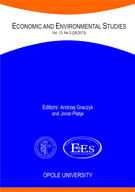Towards “Disorder” or “Dictatorship”? Labor market reform in Germany from the perspective of new comparative economics
Towards “Disorder” or “Dictatorship”? Labor market reform in Germany from the perspective of new comparative economics
Author(s): Sebastian PłóciennikSubject(s): Economy
Published by: Uniwersytet Opolski
Keywords: new comparative economics; Germany; labour market reform; property rights economics
Summary/Abstract: After decades of increasing prosperity, the economic performance in Germany was relatively poor between 1995 and 2005 with a yearly average growth rate of 1.5%, while unemployment rose to over 5 million people in 2005. The author addresses two questions How can the economic downturn be explained in terms of institutional arrangements, which features caused the impact and why? Have reforms undertaken in recent years changed the institutional arrangements, and if so, what are the features of these changes? These questions are analyzed with help of the tools of the New Comparative Economics (NCE) approach, employing the premises property rights economics at the level of national economies and governance.
Journal: Economic and Environmental Studies
- Issue Year: 13/2013
- Issue No: 3 (27)
- Page Range: 311-325
- Page Count: 15
- Language: English

